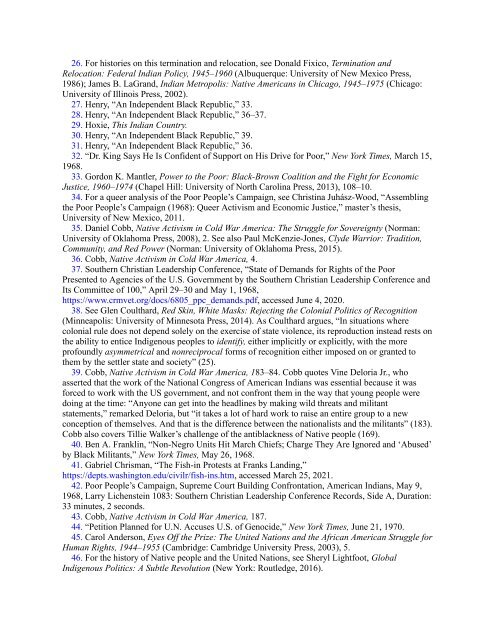Create successful ePaper yourself
Turn your PDF publications into a flip-book with our unique Google optimized e-Paper software.
26. For histories on this termination and relocation, see Donald Fixico, Termination and<br />
Relocation: Federal Indian Policy, 1945–1960 (Albuquerque: University <strong>of</strong> New Mexico Press,<br />
1986); James B. LaGrand, Indian Metropolis: Native Americans in Chicago, 1945–1975 (Chicago:<br />
University <strong>of</strong> Illinois Press, 2002).<br />
27. Henry, “<strong>An</strong> Independent Black Republic,” 33.<br />
28. Henry, “<strong>An</strong> Independent Black Republic,” 36–37.<br />
29. Hoxie, This Indian Country.<br />
30. Henry, “<strong>An</strong> Independent Black Republic,” 39.<br />
31. Henry, “<strong>An</strong> Independent Black Republic,” 36.<br />
32. “Dr. King Says He Is Confident <strong>of</strong> Support on His Drive for Poor,” New York Times, March 15,<br />
1968.<br />
33. Gordon K. Mantler, Power to <strong>the</strong> Poor: Black-Brown Coalition and <strong>the</strong> Fight for Economic<br />
Justice, 1960–1974 (Chapel Hill: University <strong>of</strong> North Carolina Press, 2013), 108–10.<br />
34. For a queer analysis <strong>of</strong> <strong>the</strong> Poor People’s Campaign, see Christina Juhász-Wood, “Assembling<br />
<strong>the</strong> Poor People’s Campaign (1968): Queer Activism and Economic Justice,” master’s <strong>the</strong>sis,<br />
University <strong>of</strong> New Mexico, 2011.<br />
35. Daniel Cobb, Native Activism in Cold War America: The Struggle for Sovereignty (Norman:<br />
University <strong>of</strong> Oklahoma Press, 2008), 2. See also Paul McKenzie-Jones, Clyde Warrior: Tradition,<br />
Community, and Red Power (Norman: University <strong>of</strong> Oklahoma Press, 2015).<br />
36. Cobb, Native Activism in Cold War America, 4.<br />
37. Sou<strong>the</strong>rn Christian Leadership Conference, “State <strong>of</strong> Demands for Rights <strong>of</strong> <strong>the</strong> Poor<br />
Presented to Agencies <strong>of</strong> <strong>the</strong> U.S. Government by <strong>the</strong> Sou<strong>the</strong>rn Christian Leadership Conference and<br />
Its Committee <strong>of</strong> 100,” April 29–30 and May 1, 1968,<br />
https://www.crmvet.org/docs/6805_ppc_demands.pdf, accessed June 4, 2020.<br />
38. See Glen Coulthard, Red Skin, White Masks: Rejecting <strong>the</strong> Colonial Politics <strong>of</strong> Recognition<br />
(Minneapolis: University <strong>of</strong> Minnesota Press, 2014). As Coulthard argues, “In situations where<br />
colonial rule does not depend solely on <strong>the</strong> exercise <strong>of</strong> state violence, its reproduction instead rests on<br />
<strong>the</strong> ability to entice <strong>Indigenous</strong> peoples to identify, ei<strong>the</strong>r implicitly or explicitly, with <strong>the</strong> more<br />
pr<strong>of</strong>oundly asymmetrical and nonreciprocal forms <strong>of</strong> recognition ei<strong>the</strong>r imposed on or granted to<br />
<strong>the</strong>m by <strong>the</strong> settler state and society” (25).<br />
39. Cobb, Native Activism in Cold War America, 183–84. Cobb quotes Vine Deloria Jr., who<br />
asserted that <strong>the</strong> work <strong>of</strong> <strong>the</strong> National Congress <strong>of</strong> American Indians was essential because it was<br />
forced to work with <strong>the</strong> US government, and not confront <strong>the</strong>m in <strong>the</strong> way that young people were<br />
doing at <strong>the</strong> time: “<strong>An</strong>yone can get into <strong>the</strong> headlines by making wild threats and militant<br />
statements,” remarked Deloria, but “it takes a lot <strong>of</strong> hard work to raise an entire group to a new<br />
conception <strong>of</strong> <strong>the</strong>mselves. <strong>An</strong>d that is <strong>the</strong> difference between <strong>the</strong> nationalists and <strong>the</strong> militants” (183).<br />
Cobb also covers Tillie Walker’s challenge <strong>of</strong> <strong>the</strong> antiblackness <strong>of</strong> Native people (169).<br />
40. Ben A. Franklin, “Non-Negro Units Hit March Chiefs; Charge They Are Ignored and ‘Abused’<br />
by Black Militants,” New York Times, May 26, 1968.<br />
41. Gabriel Chrisman, “The Fish-in Protests at Franks Landing,”<br />
https://depts.washington.edu/civilr/fish-ins.htm, accessed March 25, 2021.<br />
42. Poor People’s Campaign, Supreme Court Building Confrontation, American Indians, May 9,<br />
1968, Larry Lichenstein 1083: Sou<strong>the</strong>rn Christian Leadership Conference Records, Side A, Duration:<br />
33 minutes, 2 seconds.<br />
43. Cobb, Native Activism in Cold War America, 187.<br />
44. “Petition Planned for U.N. Accuses U.S. <strong>of</strong> Genocide,” New York Times, June 21, 1970.<br />
45. Carol <strong>An</strong>derson, Eyes Off <strong>the</strong> Prize: The <strong>United</strong> Nations and <strong>the</strong> African American Struggle for<br />
Human Rights, 1944–1955 (Cambridge: Cambridge University Press, 2003), 5.<br />
46. For <strong>the</strong> history <strong>of</strong> Native people and <strong>the</strong> <strong>United</strong> Nations, see Sheryl Lightfoot, Global<br />
<strong>Indigenous</strong> Politics: A Subtle Revolution (New York: Routledge, 2016).


















